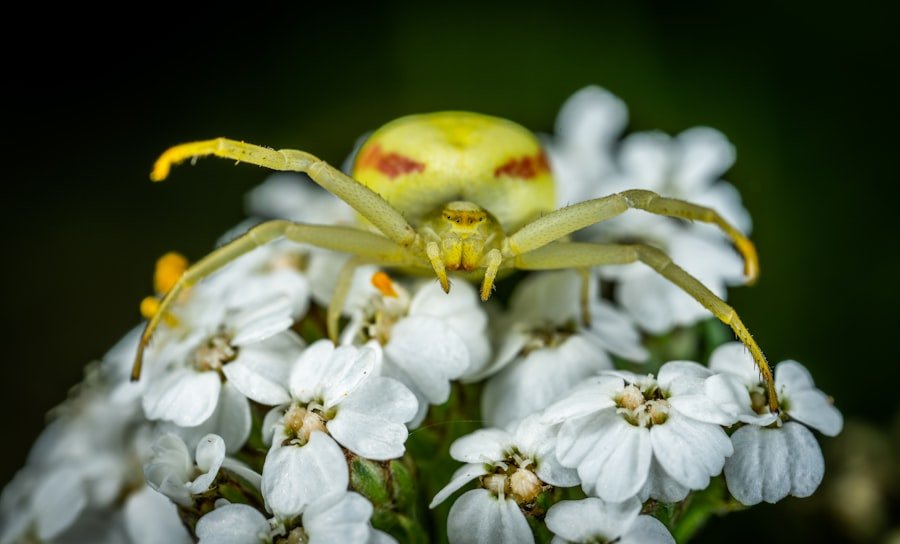When we think about spider bites, our minds often conjure images of dramatic scenarios, perhaps influenced by movies or urban legends. However, the reality is that most spider bites are harmless and may go unnoticed. Spiders are generally shy creatures that prefer to avoid human interaction.
They bite only when they feel threatened or cornered. Understanding the nature of these bites is crucial for us to respond appropriately. The anatomy of a spider bite involves the injection of venom through fangs, which can vary in potency depending on the species.
While many spiders possess venom, only a few have the capability to cause significant harm to humans. The majority of bites result in mild irritation, resembling a mosquito bite, and can be treated easily at home. By familiarizing ourselves with the characteristics of spider bites, we can better assess our situations and determine the necessary steps to take.
Key Takeaways
- Spider bites can range from mild irritation to severe symptoms, depending on the species of spider and individual reaction.
- Common symptoms of spider bites include redness, swelling, pain, and itching at the bite site, as well as muscle pain, fever, and chills.
- Dangerous spider species such as black widows and brown recluses can cause more severe symptoms and require immediate medical attention.
- Seek medical attention if you experience severe symptoms, have been bitten by a dangerous spider, or are unsure of the spider species.
- First aid for spider bites includes cleaning the bite area, applying a cold compress, and elevating the affected limb to reduce swelling.
Identifying Common Symptoms
Initial Symptoms
Initially, we may experience localized pain or a burning sensation at the site of the bite. This can be accompanied by redness and swelling, which are common inflammatory responses.
Severe Symptoms
However, we should remain vigilant for more severe symptoms that may indicate a more dangerous bite. These can include intense pain that spreads beyond the bite area, fever, chills, or even muscle cramps.
Seeking Medical Attention
If we notice any unusual symptoms such as difficulty breathing or swelling in the face or throat, it is imperative that we seek medical attention immediately. By being aware of these signs, we can take proactive measures to ensure our health and safety.
Recognizing Dangerous Spider Species

While most spiders are harmless, it is important for us to be able to identify those that pose a threat. The black widow and brown recluse are two of the most notorious spiders in North America. The black widow is easily recognizable by its glossy black body and distinctive red hourglass marking on its abdomen.
Its bite can lead to severe pain and muscle cramps, requiring immediate medical attention. The brown recluse, on the other hand, is often more elusive due to its muted coloration and tendency to hide in dark corners. Its bite can cause necrosis, leading to severe tissue damage if left untreated.
By educating ourselves about these dangerous species and their habitats, we can take steps to avoid encounters and protect ourselves from potential harm.
Seeking Medical Attention
In cases where we suspect a spider bite may be serious, seeking medical attention should be our top priority. It is essential for us to communicate clearly with healthcare professionals about our symptoms and any known exposure to dangerous spider species. This information will help them assess our condition more accurately and determine the appropriate course of action.
In some instances, we may require antivenom or other medical interventions to counteract the effects of venom. Even if we believe our symptoms are mild, it is always better to err on the side of caution. A healthcare provider can offer reassurance and guidance on how to manage our symptoms effectively while monitoring for any potential complications.
First Aid for Spider Bites
When we find ourselves dealing with a spider bite, knowing how to administer first aid can make a significant difference in our recovery process.
The first step is to clean the bite area gently with soap and water to reduce the risk of infection.
After cleaning, applying a cool compress can help alleviate swelling and discomfort.
Over-the-counter pain relievers such as ibuprofen or acetaminophen can also be beneficial in managing pain and inflammation.
If we notice any signs of infection, such as increased redness or pus, it is crucial that we seek medical attention promptly. By taking these initial steps, we can help ensure that our recovery is as smooth as possible.
Home Remedies for Spider Bites

In addition to conventional first aid methods, many of us may find relief through home remedies for spider bites. One popular option is applying a paste made from baking soda and water directly to the bite site. This mixture can help neutralize acidity and reduce itching and swelling.
Another effective remedy is using aloe vera gel, known for its soothing properties and ability to promote healing. Essential oils such as tea tree oil or lavender oil may also provide relief due to their anti-inflammatory and antiseptic qualities. We should always remember to perform a patch test before applying any new substance to our skin to avoid adverse reactions.
While home remedies can be helpful, they should not replace professional medical advice when necessary.
Preventing Spider Bites
Prevention is key when it comes to avoiding spider bites altogether. We can take several proactive measures to minimize our risk of encountering spiders in our daily lives. For instance, wearing long sleeves and pants when working outdoors or in areas where spiders may reside can provide an extra layer of protection against bites.
Additionally, keeping our living spaces tidy and clutter-free can deter spiders from making themselves at home in our homes. Regularly vacuuming corners, under furniture, and other hidden areas can help eliminate potential hiding spots for these creatures. By adopting these preventive strategies, we can significantly reduce our chances of experiencing a spider bite.
Using Insect Repellent
Insect repellents are not just for mosquitoes; they can also be effective against spiders. When we venture into areas where spiders are prevalent, applying a suitable insect repellent can create a barrier that deters them from approaching us. Look for products containing DEET or picaridin, as these ingredients have been shown to repel various insects effectively.
Before applying any repellent, it’s important for us to read the instructions carefully and follow them closely for maximum effectiveness. Reapplying as directed will ensure that we maintain protection throughout our time outdoors. By incorporating insect repellent into our outdoor routines, we can enjoy nature while minimizing our risk of spider encounters.
Keeping Your Home Spider-Free
Maintaining a spider-free home requires consistent effort on our part. Regular cleaning is essential; dusting surfaces and vacuuming floors will help eliminate webs and potential egg sacs that could lead to future infestations. We should also pay attention to areas like basements, attics, and garages where spiders tend to thrive due to their dark and undisturbed environments.
Sealing cracks and crevices around windows and doors can prevent spiders from entering our homes in the first place. Installing screens on windows and doors will also provide an additional barrier against these eight-legged intruders. By taking these steps diligently, we can create an environment that is less inviting for spiders.
When to Call a Professional Exterminator
Despite our best efforts at prevention, there may come a time when we need to call in a professional exterminator. If we notice an unusual number of spiders in our home or if we suspect an infestation, it’s wise to seek expert assistance. Professionals have access to specialized tools and treatments that can effectively eliminate spiders while ensuring safety for us and our families.
Additionally, if we have encountered a dangerous spider species or if someone in our household has been bitten and is experiencing severe symptoms, contacting an exterminator becomes even more critical. They can assess the situation thoroughly and provide tailored solutions that address our specific needs.
Staying Safe from Spider Bites
In conclusion, staying safe from spider bites involves a combination of awareness, prevention, and prompt action when necessary. By understanding the nature of spider bites and recognizing the symptoms associated with them, we empower ourselves to respond effectively in case of an encounter. Identifying dangerous species allows us to take precautions that protect us from harm.
Moreover, implementing preventive measures in our homes and using insect repellents when outdoors can significantly reduce our risk of bites. Should we find ourselves dealing with a spider bite, knowing how to administer first aid and when to seek medical attention is crucial for ensuring our well-being. Ultimately, by remaining informed and proactive, we can coexist with these fascinating creatures while minimizing any potential risks they may pose.
If you are interested in learning more about cosmetic dermatology treatments, you may want to check out this article on cosmetic enhancements. Dr. Trisha Khanna also provides a comprehensive guide on laser hair removal for the beard in this article. Additionally, if you are considering laser treatment for varicose veins, you can find out what to expect in this article.
FAQs
What are the common symptoms of a spider bite?
Some common symptoms of a spider bite include redness, swelling, pain, and itching at the site of the bite. In some cases, a spider bite may also cause fever, chills, and muscle cramps.
How can I identify a spider bite?
Identifying a spider bite can be difficult as many other insect bites can cause similar symptoms. However, if you saw the spider that bit you, or if you have a clear bite mark with the symptoms mentioned above, it is likely a spider bite.
What should I do if I suspect I have been bitten by a spider?
If you suspect you have been bitten by a spider, it is important to clean the bite area with soap and water, apply a cold compress to reduce swelling, and seek medical attention if the symptoms worsen or if you are unsure of the type of spider that bit you.
How can spider bites be treated?
Treatment for spider bites may include over-the-counter pain relievers, antihistamines to reduce itching, and in some cases, antibiotics if the bite becomes infected. Severe reactions to spider bites may require medical intervention.
What are the most common types of spiders that are known to bite humans?
The most common types of spiders known to bite humans include the brown recluse spider, the black widow spider, and the hobo spider. It is important to seek medical attention if bitten by any of these spiders.


